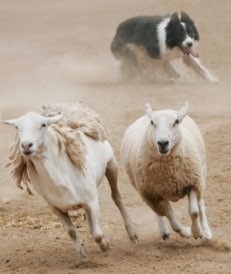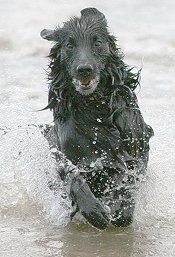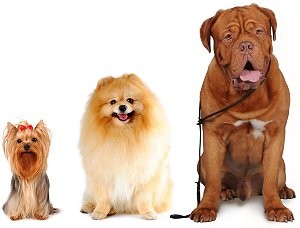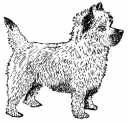Learn about your dog's breed
By Michele Welton, Dog Trainer, Breed Selection Consultant, Author of 15 Dog Books
It's always a good idea to find out something about the typical temperament and behavior of your dog's breed.
Some dogs do certain things because those things are "hardwired" into their genes.
 Most breeds, you see, were developed for a reason...
Most breeds, you see, were developed for a reason...
...and that reason usually had to do with working abilities. For example, herding sheep, killing rodents in the barn, hunting rabbits or foxes, treeing raccoons, flushing gamebirds out of the brambles, pulling carts and sleds, guarding and protecting, and so on.
When developing breeds for working purposes, breeders discovered that certain behavioral traits were essential for certain types of work. By only breeding together dogs who had these behavioral characteristics, these "working" behaviors became "hardwired" into the breed's genes.
In other words, your dog's parents passed along genes that included those working behaviors.
 Working behaviors include:
Working behaviors include:
- high energy level, high endurance, high exercise needs
- chasing (and/or grabbing or nipping) at things that move (running children, running animals, moving bikes & cars)
- aggression toward other animals
- digging holes
- barking, baying, howling
- suspiciousness toward strangers
- exploratory instincts – tendency to run off, escape, follow their nose in search of adventure
- independence, preferring to make their own decisions
The good news about working behaviors is this:
If you want a dog for, say, hunting or herding, you can choose a purebred who was developed to do that type of work and there's a fair to good chance he will have inherited those behavioral genes.
The bad news about working behaviors is this:
If you just want a family companion, working behaviors can be a real nuisance, and because they're "hardwired" into the genes, they can be more resistant to change.
You might be wondering, "But isn't a dog's environment – the way he's raised – more important than heredity?"
With most dogs, yes, absolutely. Even when a dog has a genetic predisposition for certain traits, proper training can usually control the expression of that trait.
For example, I have a Poodle and a Chihuahua. Both breeds have a genetic tendency toward barking. But because of proper training, there is no indiscriminate barking in my household.
But with some dogs, NO, their genetic proclivities are too strong to be changed. Managed, yes. But not completely changed.
For example, many Akitas and Alaskan Malamutes will never tolerate another dog of the same sex (or a cat) no matter how hard you try. In fact, trying may lead to serious injury or death.
So if you're hoping that you can take any dog and easily transform him into the kind of dog you want... that's unrealistic.
Yes, temperament and behavior are definitely influenced by environment, which includes how you raise and train your dog.
But also very important – and in some dogs, MORE important – is innate genetic temperament, the genes your dog was born with.
 And take heed! The influence of environment can work against you too. In other words, if you screw up a dog's raising and training, you can end up with a badly-behaved dog even if he inherited good genes for a nice, good-natured temperament!
And take heed! The influence of environment can work against you too. In other words, if you screw up a dog's raising and training, you can end up with a badly-behaved dog even if he inherited good genes for a nice, good-natured temperament!
For example, for a solid family dog, it's hard to beat the lovely genetic temperament of a good Labrador or Golden Retriever. And yet I've seen LOTS of great-tempered Lab and Golden puppies whose good-natured behavior started going south due to improper raising and training. So you see, if you screw things up, even lovely genetic characteristics can go straight out the window!
To sum up: Both genetics and environment are influential in how your dog turns out. But within any individual dog, one of these influences is often stronger than the other.
And now...
After all this discussion about "typical" temperament and behavior, I need to kick sand all over the clean floor by telling you that some purebred dogs actually don't have the temperament and behaviors that are typical for their breed.
In other words, some purebred dogs don't conform to the norm.
Within every breed, you can find energetic individuals and placid individuals. Dominant and submissive individuals. Stubborn and eager-to-please individuals. Standoffish introverts and outgoing extroverts.
Purebred puppies, you see, are not guaranteed to grow up with a certain temperament or set of behaviors.
Why not?
Well, we just talked about the role of environment (raising and training) on temperament and behavior. In addition, some purebred puppies don't grow up with their breed's typical temperament because one or both of their parents didn't have those GENES to pass along to their offspring.
Now, it's okay for a dog not to inherit the typical genes for his breed if those genes happen to be for behaviors that would have been undesirable to you!
 Take, for example, a Jack Russell Terrier's "hardwired" tendency to be very energetic and independent. If your particular Jack Russell puppy turned out to be calmer and more obedient than a "typical" Jack Russell, that would be appreciated by most families!
Take, for example, a Jack Russell Terrier's "hardwired" tendency to be very energetic and independent. If your particular Jack Russell puppy turned out to be calmer and more obedient than a "typical" Jack Russell, that would be appreciated by most families!
But non-typical genes can be BAD if the behavior you were expecting was positive. For example, if you chose a Golden Retriever because you wanted a friendly, sociable dog, it would be very disappointing if your Golden puppy turned out shy or aggressive. Yes, sad to say, there are plenty of shy or aggressive Goldens.
You can minimize this risk by never acquiring a purebred pup unless you've personally evaluated both parents to ensure that THEY have the positive traits you're looking for.
If you want to be even more certain of temperament, acquire an adult dog rather than a puppy. There are plenty of adult dogs who have already proven themselves not to have characteristics that are undesirable to you. If you find such an adult, don't let "typical breed negatives" worry you. When you acquire an adult, you're acquiring what he already IS.

Yorkshire Terrier, Pomeranian, Dogue de Bordeaux
So what should you expect from your breed?
So now you know that not all purebred dogs will have the temperament and behavior you might expect for their breed.
But don't get sidetracked by that possibility.
Unless you know for sure that your individual dog ISN'T typical of his breed, you should assume that he IS – and you should find out what your breed was developed to do so you will be able to predict the behavioral traits your dog is likely to have.
 By knowing what to watch for, you will be aware of potential trouble areas. For example, when your Cairn Terrier starts digging holes, you'll know that you may need to work harder to get him to obey "No" to hole-digging than you might with, say, a digging Cocker Spaniel. Terriers were bred to dig – spaniels were not.
By knowing what to watch for, you will be aware of potential trouble areas. For example, when your Cairn Terrier starts digging holes, you'll know that you may need to work harder to get him to obey "No" to hole-digging than you might with, say, a digging Cocker Spaniel. Terriers were bred to dig – spaniels were not.
To find out about your breed, read my honest reviews.
If you discover that your breed is typically stubborn or independent, don't give up! By teaching your dog new words, rules, and routines, you will be demonstrating that you are a capable teacher/leader who is worthy of respect. Even a stubborn, independent dog understands that. A dog is always more inclined to want to please someone he respects.
So even if your breed is challenging to work with in the beginning, don't give up. The first words are often the hardest for stubborn dogs and slow learners.
By the time you get to the words further along in this training program, your dog will have gotten the hang of the concept that sounds have meaning – and YOU will have gotten the hang of how to get across to him the meaning of each new sound.
Teaching and learning will become faster and easier for both of you!
My best-selling books – now available FREE on my website
 Respect Training For Puppies: 30 seconds to a calm, polite, well-behaved puppy is for puppies 2 to 18 months old. Your puppy will learn the 21 skills that all family dogs need to know. Click here to read for free.
Respect Training For Puppies: 30 seconds to a calm, polite, well-behaved puppy is for puppies 2 to 18 months old. Your puppy will learn the 21 skills that all family dogs need to know. Click here to read for free. Teach Your Dog 100 English Words is a unique Vocabulary and Respect Training Program that will teach your adult dog to listen to you and do what you say. Click here to read for free.
Teach Your Dog 100 English Words is a unique Vocabulary and Respect Training Program that will teach your adult dog to listen to you and do what you say. Click here to read for free. 11 Things You Must Do Right To Keep Your Dog Healthy and Happy helps your dog live a longer, healthier life. Get my honest advice about all 11 Things before you bring home your new puppy, because some mistakes with early health care cannot be undone. Click here to read for free.
11 Things You Must Do Right To Keep Your Dog Healthy and Happy helps your dog live a longer, healthier life. Get my honest advice about all 11 Things before you bring home your new puppy, because some mistakes with early health care cannot be undone. Click here to read for free.
